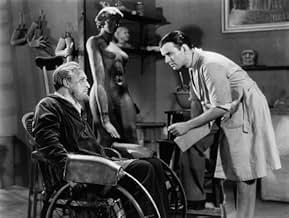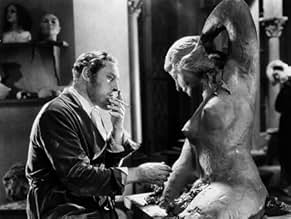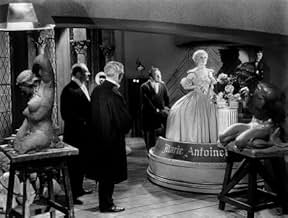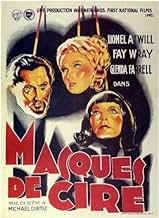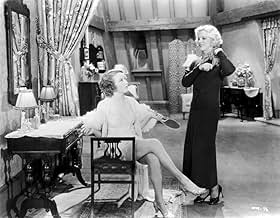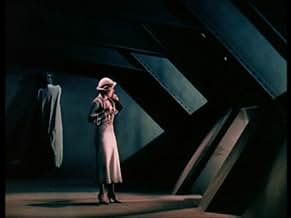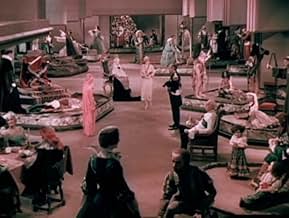Das Geheimnis des Wachsfigurenkabinetts
Originaltitel: Mystery of the Wax Museum
IMDb-BEWERTUNG
6,8/10
7269
IHRE BEWERTUNG
Füge eine Handlung in deiner Sprache hinzuThe disappearance of people and corpses leads a reporter to a wax museum and a sinister sculptor.The disappearance of people and corpses leads a reporter to a wax museum and a sinister sculptor.The disappearance of people and corpses leads a reporter to a wax museum and a sinister sculptor.
- Regie
- Drehbuch
- Hauptbesetzung
Thomas E. Jackson
- Detective
- (as Thomas Jackson)
Bull Anderson
- Janitor
- (Nicht genannt)
Frank Austin
- Winton's Valet
- (Nicht genannt)
Max Barwyn
- Museum Visitor
- (Nicht genannt)
Wade Boteler
- Ambrose
- (Nicht genannt)
Empfohlene Bewertungen
In the early 30s, Hungarian director Michael Curtiz was still considered a recently arrived foreigner working at Warner Bros. after impressing legendary producer Jack Warner with his work in Germany. In those early days of his career in the U.S. Curtiz began to make himself a name as a hard working director who always managed to work effectively under the studio system, and it was with the success of the horror films, "The Mad Genius" and "Doctor X", when he proved to be not only effective, but also able to make box-office hits. It was really the success of "Doctor X" what prompted Warner Brothers to make another horror movie in the same style, with the same same cast, and keeping Michael Curtiz as director. The result was the now classic Technicolor thriller, "Mystery of the Wax Museum".
Ivan Igor (Lionel Atwill) is an extremely talented sculptor of wax figures in London, however, his employer thinks that Igor's business i snot making enough money for both of them, and starts a fire at Igor's Wax Museum in order to collect the insurance money. Thirteen years later, Ivan Igor is tragically crippled and unable to use his hands, but with the help of his students he is finally ready to reopen his museum in New York City. In the meantime, the police is baffled by the case of several corpses stolen from the City's morgue, including the one of a famous socialité. The case attracts the attention of Florence Dempsey (Glenda Farrell), a young reporter looking for her big story, and immediately she starts to investigate. Her suspicion will lead her to important clues, and Igor's strange obsession with Florence's roommate Charlotte (Fay Wray) will take her to uncover the strange mystery of the Wax Museum.
The key word in "Mystery of the Wax Museum" is "Mystery", as unlike it's better known 1953 remake (which focuses on horror and suspense), this version of Charles Belden's play behaves more like a simple, yet really captivating, tale of mystery where our main character, Florence, must discover who and more importantly "how" is committing the crimes. Adapted by Don Mullaly and Carl Erickson, the movie has a very original plot that unfolds nicely despite the fast pace of the film. The fact that it was written before the days of the Hays code allows the film to include lots of sexual innuendo and situations that later would be considered immoral. The characters are overall very well developed, and the addition of comedy (courtesy of Farrell's wisecracking character) works nicely with the creepy mystery of the story.
On of the lasts movies to be shot in the primitive two-color Technicolor system, it has a marvelous bleached look that works perfectly with the modernist art-deco style of the sets designed for the film. Director Michael Curtiz allows himself to show the influence he received when working in Germany during the years of expressionism, and gives the film an ominous dark look as Florence gets deeper inside the Wax Museum (although not as striking as what Universal Studios did with its horror films). It's worth to point out that while Curtiz may be better known as an effective director for hire under the studio system, he really shows a definite style in this film, and begins to give form to the elements that would later become part of his masterpiece, "Casablanca".
The cast is overall excellent, although it is of course difficult not to make comparisons with the performances of the better known 50s version. Lionel Atwill offers one of his most underrated performances of his career as Ivan Igor, and while he lacks the charm that Vincent Price would give to the role, he is very believable as the tortured artist, victim of misfortune. Glenda Farrell's turn as Florence Dempsey has been harshly criticized due to the comic nature of her character's persona, but honestly she makes a terrific job as the main character, vastly overshadowing the more famous Fay Wray; who while looking stunningly beautiful here, lacks the presence that would make her an icon in "King Kong".
While "House of Wax" tends to get the upper hand when compared to the original version, "Mystery" is by no means a bad movie, simply a different one. As written above, this movie focuses completely on the mystery aspect of the story, and while it does have its fair share of horrific elements, they are minimal when compared with the Gothic horror of "House of Wax". True, it certainly looks dated by today's standards, but the movie has a notorious modernist (in the architecture, designs, etc...) touch that may have looked futurist for the 30s society. The special effects are definitely less impressive than in the remake, but considering the times when they were done are still an excellent work, and some look really impressive thanks to the lavish Technicolor process.
Personally, I find in "House" and "Mystery" a classic example of what a remake should be, as the two are excellent movies that explore the same story under different angles. Fans tend to dismiss "Mystery", but I think it's equally as good as the legendary Vincent Price film. "Mystery of the Wax Museum" is a very interesting movie for fans of "House of Wax", and a definitive must-see for those interested in horror movies of the 30s. 8/10
Ivan Igor (Lionel Atwill) is an extremely talented sculptor of wax figures in London, however, his employer thinks that Igor's business i snot making enough money for both of them, and starts a fire at Igor's Wax Museum in order to collect the insurance money. Thirteen years later, Ivan Igor is tragically crippled and unable to use his hands, but with the help of his students he is finally ready to reopen his museum in New York City. In the meantime, the police is baffled by the case of several corpses stolen from the City's morgue, including the one of a famous socialité. The case attracts the attention of Florence Dempsey (Glenda Farrell), a young reporter looking for her big story, and immediately she starts to investigate. Her suspicion will lead her to important clues, and Igor's strange obsession with Florence's roommate Charlotte (Fay Wray) will take her to uncover the strange mystery of the Wax Museum.
The key word in "Mystery of the Wax Museum" is "Mystery", as unlike it's better known 1953 remake (which focuses on horror and suspense), this version of Charles Belden's play behaves more like a simple, yet really captivating, tale of mystery where our main character, Florence, must discover who and more importantly "how" is committing the crimes. Adapted by Don Mullaly and Carl Erickson, the movie has a very original plot that unfolds nicely despite the fast pace of the film. The fact that it was written before the days of the Hays code allows the film to include lots of sexual innuendo and situations that later would be considered immoral. The characters are overall very well developed, and the addition of comedy (courtesy of Farrell's wisecracking character) works nicely with the creepy mystery of the story.
On of the lasts movies to be shot in the primitive two-color Technicolor system, it has a marvelous bleached look that works perfectly with the modernist art-deco style of the sets designed for the film. Director Michael Curtiz allows himself to show the influence he received when working in Germany during the years of expressionism, and gives the film an ominous dark look as Florence gets deeper inside the Wax Museum (although not as striking as what Universal Studios did with its horror films). It's worth to point out that while Curtiz may be better known as an effective director for hire under the studio system, he really shows a definite style in this film, and begins to give form to the elements that would later become part of his masterpiece, "Casablanca".
The cast is overall excellent, although it is of course difficult not to make comparisons with the performances of the better known 50s version. Lionel Atwill offers one of his most underrated performances of his career as Ivan Igor, and while he lacks the charm that Vincent Price would give to the role, he is very believable as the tortured artist, victim of misfortune. Glenda Farrell's turn as Florence Dempsey has been harshly criticized due to the comic nature of her character's persona, but honestly she makes a terrific job as the main character, vastly overshadowing the more famous Fay Wray; who while looking stunningly beautiful here, lacks the presence that would make her an icon in "King Kong".
While "House of Wax" tends to get the upper hand when compared to the original version, "Mystery" is by no means a bad movie, simply a different one. As written above, this movie focuses completely on the mystery aspect of the story, and while it does have its fair share of horrific elements, they are minimal when compared with the Gothic horror of "House of Wax". True, it certainly looks dated by today's standards, but the movie has a notorious modernist (in the architecture, designs, etc...) touch that may have looked futurist for the 30s society. The special effects are definitely less impressive than in the remake, but considering the times when they were done are still an excellent work, and some look really impressive thanks to the lavish Technicolor process.
Personally, I find in "House" and "Mystery" a classic example of what a remake should be, as the two are excellent movies that explore the same story under different angles. Fans tend to dismiss "Mystery", but I think it's equally as good as the legendary Vincent Price film. "Mystery of the Wax Museum" is a very interesting movie for fans of "House of Wax", and a definitive must-see for those interested in horror movies of the 30s. 8/10
MYSTERY OF THE WAX MUSEUM (Warner Brothers, 1933), reunites director Michael Curtiz with his DOCTOR X (First National, 1932) co-stars, Lionel Atwill and Fay Wray, in another two-strip Technicolor horror/comedy mystery. A carbon copy of DOCTOR X with a few alterations and improvements thrown in, it ranks the finest and most noteworthy of the Atwill-Fay collaborations (1933's THE VAMPIRE BAT for Majestic was their second), as well as the most eerie and mysterious of them all. While Atwill and Wray had equal status in their initial two outings, Atwill this time dominates while Wray, interestingly, has little to do, not making her screen presence until 30 minutes from the opening titles. She's gone for long stretches and is not visible in the fade-out while Glenda Farrell, the secondary female character, comes close to being the lead, or so it appears. Regardless of Wray's limitations, her character is quite crucial to the story and to Atwill's mentally unbalanced character.
Opening with a prologue set in 1921 London introduces Ivan Igor (Lionel Atwill) as a brilliant sculptor of wax figures of noteworthy figures as Joan of Arc, Jack the Ripper, Disraeli, and his most favorite, Marie Antoinette, hoping for his museum to become successful once it opens to the public. Because he's invested more money than anticipated, Joe Worth (Edwin Maxwell), his partner whom he owes back salary, comes upon a plan to get back some of his investment by burning down the museum and collect on the fire insurance. A fight ensues between the two partners, with Worth breaking away, locking Igor inside the museum surrounded by flames where he's left to burn along with his wax figures. Move forward, New Year's Eve, 1933, in New York City. Ivan, who has survived the burning flames, is wheelchair bound. Unable to recreate his wax figures due to his severely burned hands, he hires assistants, Ralph (Allen Vincent); D'Arcy (Arthur Edmund Carewe) and Hugo (Matthew Betz) to sculpt wax figures for him under his supervision. Successfully reproducing his original creations, Igor is unable to do the same with Marie Antoinette, that is, until he meets her replica, Charlotte Duncan (Fay Wray), Ralph's fiancée. In the meantime, a series of murders have taken place with bodies mysteriously disappearing from the morgue from some figure in a cloak. Millionaire playboy Harold Ritten (Gavin Gordon), who happened to be with Joan Gale on the night of her murder, is suspected and jailed. Florence Parks (Glenda Farrell), Charlotte's roommate and gal reporter for the New York Express, is assigned by her editor (Frank McHugh) to investigate. Following her interview with Harold leading to her constant snooping around Igor's 14th Street wax museum, she discovers something quite startling in connection to the murder, hence "the mystery of the wax museum."
If the story sounds at all familiar, it was reworked more famously as HOUSE OF WAX (Warners, 1954) starring Vincent Price in the Atwill role. Due to the popularity of the remake, the original from which it was based, was virtually unknown, especially since no prints of MYSTERY OF THE WAX MUSEUM have survived. Fortunately, an original print was discovered, according to sources, in Jack L. Warner's private vault around the late 1960s. WAX MUSEUM finally turned up on commercial television, notably on New York City's WPIX, Channel 11's "Chiller Theater" on February 10, 1973, where it broadcast annually until 1978, only in black and white format only. It would be another decade before two-strip Technicolor prints surfaced and distributed on home video and DVD, with broadcasts on Turner Network Television (1988-1993) and finally Turner Classic Movies (1994-present).
With Glenda Farrell assuming the wisecracking reporter role Lee Tracy enacted in DOCTOR X, her performance in this venture seems right and warranted, improving over Tracy's lackluster buffoonery. Even if Farrell's character disappoints, the script does not and neither does Atwill. Who could forget his key scenes as the bearded Igor conversing with his favorite wax figure of Marie Antoinette, and his outlook as he witnesses the melting of his "children" in a blazing fire (very realistically done and effective in color), along with his unforgettable confrontation with the screaming Wray as he offers her "eternal life" in the manner that would have done 1925s "Phantom of the Opera" star Lon Chaney proud had he lived to see this.
In some ways, THE MYSTERY OF THE WAX MUSEUM is perfect, in others it's not, but must have been good enough to acquire a remake, find the missing negative for the original and have it displayed as one of the finer horror classics to come out from the 1930s. (**1/2)
Opening with a prologue set in 1921 London introduces Ivan Igor (Lionel Atwill) as a brilliant sculptor of wax figures of noteworthy figures as Joan of Arc, Jack the Ripper, Disraeli, and his most favorite, Marie Antoinette, hoping for his museum to become successful once it opens to the public. Because he's invested more money than anticipated, Joe Worth (Edwin Maxwell), his partner whom he owes back salary, comes upon a plan to get back some of his investment by burning down the museum and collect on the fire insurance. A fight ensues between the two partners, with Worth breaking away, locking Igor inside the museum surrounded by flames where he's left to burn along with his wax figures. Move forward, New Year's Eve, 1933, in New York City. Ivan, who has survived the burning flames, is wheelchair bound. Unable to recreate his wax figures due to his severely burned hands, he hires assistants, Ralph (Allen Vincent); D'Arcy (Arthur Edmund Carewe) and Hugo (Matthew Betz) to sculpt wax figures for him under his supervision. Successfully reproducing his original creations, Igor is unable to do the same with Marie Antoinette, that is, until he meets her replica, Charlotte Duncan (Fay Wray), Ralph's fiancée. In the meantime, a series of murders have taken place with bodies mysteriously disappearing from the morgue from some figure in a cloak. Millionaire playboy Harold Ritten (Gavin Gordon), who happened to be with Joan Gale on the night of her murder, is suspected and jailed. Florence Parks (Glenda Farrell), Charlotte's roommate and gal reporter for the New York Express, is assigned by her editor (Frank McHugh) to investigate. Following her interview with Harold leading to her constant snooping around Igor's 14th Street wax museum, she discovers something quite startling in connection to the murder, hence "the mystery of the wax museum."
If the story sounds at all familiar, it was reworked more famously as HOUSE OF WAX (Warners, 1954) starring Vincent Price in the Atwill role. Due to the popularity of the remake, the original from which it was based, was virtually unknown, especially since no prints of MYSTERY OF THE WAX MUSEUM have survived. Fortunately, an original print was discovered, according to sources, in Jack L. Warner's private vault around the late 1960s. WAX MUSEUM finally turned up on commercial television, notably on New York City's WPIX, Channel 11's "Chiller Theater" on February 10, 1973, where it broadcast annually until 1978, only in black and white format only. It would be another decade before two-strip Technicolor prints surfaced and distributed on home video and DVD, with broadcasts on Turner Network Television (1988-1993) and finally Turner Classic Movies (1994-present).
With Glenda Farrell assuming the wisecracking reporter role Lee Tracy enacted in DOCTOR X, her performance in this venture seems right and warranted, improving over Tracy's lackluster buffoonery. Even if Farrell's character disappoints, the script does not and neither does Atwill. Who could forget his key scenes as the bearded Igor conversing with his favorite wax figure of Marie Antoinette, and his outlook as he witnesses the melting of his "children" in a blazing fire (very realistically done and effective in color), along with his unforgettable confrontation with the screaming Wray as he offers her "eternal life" in the manner that would have done 1925s "Phantom of the Opera" star Lon Chaney proud had he lived to see this.
In some ways, THE MYSTERY OF THE WAX MUSEUM is perfect, in others it's not, but must have been good enough to acquire a remake, find the missing negative for the original and have it displayed as one of the finer horror classics to come out from the 1930s. (**1/2)
Classic horror movie directed by Michael Curtiz and starring Lionel Atwill as a deranged sculptor with an "interesting" method of making the statues on display at his wax museum. The last (and best) of the three horror movies Lionel Atwill did with Fay Wray. Atwill is fantastic here and Wray is, as always, delightful. Nice support from Frank McHugh, Gavin Gordon, and Edwin Maxwell, among others. The scene stealer of the movie is Glenda Farrell as the fast-talking reporter heroine. She really has fun with the part. A few years later she would star in the Torchy Blane series and play a character very similar to the one she plays here.
It's a good-looking movie, filmed in two-color Technicolor with nice atmospheric direction from Curtiz. The sets are great, especially Atwill's art deco laboratory. The makeup effects are terrific. It's a juicy Pre-Coder, as evidenced by the gruesome plot and the junkie character played by Arthur Edmund Carewe. Some viewers might be put off by the fact that a large chunk of the middle of the picture is more like a crime story/newspaper movie but I was always entertained, particularly by the back & forth between Farrell and McHugh. So it's not a straight horror movie from beginning to end but, so what, it's still a great film and worth a look. Remade in the '50s as House of Wax with Vincent Price. That version is more well-known than this one but I like rewatching this one more. It's just more fun.
It's a good-looking movie, filmed in two-color Technicolor with nice atmospheric direction from Curtiz. The sets are great, especially Atwill's art deco laboratory. The makeup effects are terrific. It's a juicy Pre-Coder, as evidenced by the gruesome plot and the junkie character played by Arthur Edmund Carewe. Some viewers might be put off by the fact that a large chunk of the middle of the picture is more like a crime story/newspaper movie but I was always entertained, particularly by the back & forth between Farrell and McHugh. So it's not a straight horror movie from beginning to end but, so what, it's still a great film and worth a look. Remade in the '50s as House of Wax with Vincent Price. That version is more well-known than this one but I like rewatching this one more. It's just more fun.
A genuinely frightening film from Michael Curtiz, jack of no trades and master of all. Many of the tricks of classic 1930's horror are here, including the opening scene set in a dark, rainy London street, the long shadows on the wall, lengthy periods of silence, and all timed to perfection. Only the faster-than-the-speed-of-sound dialogue of Glenda Farrell truly lets the film down. But other than that it is a gothic masterpiece, an underrated movie probably due to the fact that it lay undiscovered, thought lost, for over half a century. Far more inventive and imaginative than the majority of horror films made today.
This film, which was remade as "House Of Wax" 20 years later (as if you didn't know), might not enjoy quite the reputation it does today had it not been the basis for the better-known later film and, more importantly, believed lost for over 30 years, which made it something of a legend for many people who'd never even seen it. Legendary status can be rather difficult to live up to, and unless a viewer is approaching it with no advance knowledge of its history, MYSTERY OF THE WAX MUSEUM may not be quite what one expects.
It is, nevertheless, an energetic and entertaining amalgam of genres: horror film meets newspaper crime drama. Dropping a rather Gothic tale of body-snatching, a mad sculptor and a museum of wax-covered corpses into the streamline-moderne milieu of fast-talking, wise-cracking reporters on the trail of a hot story makes for interesting contrasts.
Lionel Atwill, as Ivan Igor, the artist driven to insanity and murder by the destruction of his wax "children" in an arson fire, was an immensely enjoyable performer whose best work came a bit later (see "Son Of Frankenstein" for his portrayal of the one-armed Insp. Krogh). His natural screen presence carries him through, though he never quite generates either the pathos or the smooth menace that Vincent Price displayed in the remake. But from the moment of her entrance, it's Glenda Farrell as Florence Dempsey, the reporter out to save her job by bringing in a scoop - barreling onto the screen with a full head of steam - who propels the story all the way to its finish.
There's an awful lot going on here beyond the basic premise; bootlegging, a "dope fiend," a suicide and a falsely implicated millionaire playboy are thrown into the mix, packing quite a lot into the 77 minute running time (the remake improved the story by eliminating extraneous characters and subplots). A pre-"King Kong" Fay Wray (in her naturally red hair sans the "Kong" blond wig) is the damsel in actual distress, but despite her billing, she's basically a supporting player and has little to do - beyond enduring roommate Florence's snide comments about her penniless boyfriend - until the climactic confrontation between all the bad guys and good guys (and girls).
MYSTERY is well-served by the direction of Michael Curtiz ("Adventures Of Robin Hood," "Casablanca"), who was something of a jack-of-all-genres, and there's plenty of snappy dialogue, some of which (Florence asking a cop, "How's your sex life?") wouldn't have made it to the screen a year later under the newly re-written Production Code. Depending on one's point of view, it could be said that the very effective production design either benefits, or suffers, from the pale pastels of the two-strip Technicolor photography. For my part, I'm guessing that the subdued tones we see today result from the lack of first-rate film elements available. Having seen far superior two-strip from years earlier, I'll wager that the original prints were much more vivid.
If you're any kind of a fan of the remake, you do owe it to yourself to see this one, if only once. There are many things to enjoy in MYSTERY OF THE WAX MUSEUM, not the least of which are the fabulous ensembles worn by Farrell. Just how does a newspaper reporter one step away from the breadline afford a wardrobe like that?
It is, nevertheless, an energetic and entertaining amalgam of genres: horror film meets newspaper crime drama. Dropping a rather Gothic tale of body-snatching, a mad sculptor and a museum of wax-covered corpses into the streamline-moderne milieu of fast-talking, wise-cracking reporters on the trail of a hot story makes for interesting contrasts.
Lionel Atwill, as Ivan Igor, the artist driven to insanity and murder by the destruction of his wax "children" in an arson fire, was an immensely enjoyable performer whose best work came a bit later (see "Son Of Frankenstein" for his portrayal of the one-armed Insp. Krogh). His natural screen presence carries him through, though he never quite generates either the pathos or the smooth menace that Vincent Price displayed in the remake. But from the moment of her entrance, it's Glenda Farrell as Florence Dempsey, the reporter out to save her job by bringing in a scoop - barreling onto the screen with a full head of steam - who propels the story all the way to its finish.
There's an awful lot going on here beyond the basic premise; bootlegging, a "dope fiend," a suicide and a falsely implicated millionaire playboy are thrown into the mix, packing quite a lot into the 77 minute running time (the remake improved the story by eliminating extraneous characters and subplots). A pre-"King Kong" Fay Wray (in her naturally red hair sans the "Kong" blond wig) is the damsel in actual distress, but despite her billing, she's basically a supporting player and has little to do - beyond enduring roommate Florence's snide comments about her penniless boyfriend - until the climactic confrontation between all the bad guys and good guys (and girls).
MYSTERY is well-served by the direction of Michael Curtiz ("Adventures Of Robin Hood," "Casablanca"), who was something of a jack-of-all-genres, and there's plenty of snappy dialogue, some of which (Florence asking a cop, "How's your sex life?") wouldn't have made it to the screen a year later under the newly re-written Production Code. Depending on one's point of view, it could be said that the very effective production design either benefits, or suffers, from the pale pastels of the two-strip Technicolor photography. For my part, I'm guessing that the subdued tones we see today result from the lack of first-rate film elements available. Having seen far superior two-strip from years earlier, I'll wager that the original prints were much more vivid.
If you're any kind of a fan of the remake, you do owe it to yourself to see this one, if only once. There are many things to enjoy in MYSTERY OF THE WAX MUSEUM, not the least of which are the fabulous ensembles worn by Farrell. Just how does a newspaper reporter one step away from the breadline afford a wardrobe like that?
Wusstest du schon
- WissenswertesThis film was produced before the Production Code. When it was remade 20 years later, as Das Kabinett des Professor Bondi (1953), all references to drug use were removed, and a character was changed from a junkie to an alcoholic.
- PatzerIvan Igor says that Jean Paul Marat's assassin, Charlotte Corday, was his mistress. This is incorrect; they never had met until she came to his office posing as a courier and quickly stabbed him to death. After her execution a few days later, she was found to be virgo intacta.
- Alternative VersionenThis film was shot in two versions. One camera unit shot the film in two-color Technicolor. A second camera unit shot the scenes at the same time in black and white. The black and white version was meant for theaters who could not afford the higher rental cost of the color prints.
- VerbindungenEdited into Mame (1974)
Top-Auswahl
Melde dich zum Bewerten an und greife auf die Watchlist für personalisierte Empfehlungen zu.
Details
- Erscheinungsdatum
- Herkunftsland
- Sprache
- Auch bekannt als
- Mystery of the Wax Museum
- Drehorte
- Produktionsfirma
- Weitere beteiligte Unternehmen bei IMDbPro anzeigen
- Laufzeit
- 1 Std. 17 Min.(77 min)
- Seitenverhältnis
- 1.37 : 1
Zu dieser Seite beitragen
Bearbeitung vorschlagen oder fehlenden Inhalt hinzufügen


